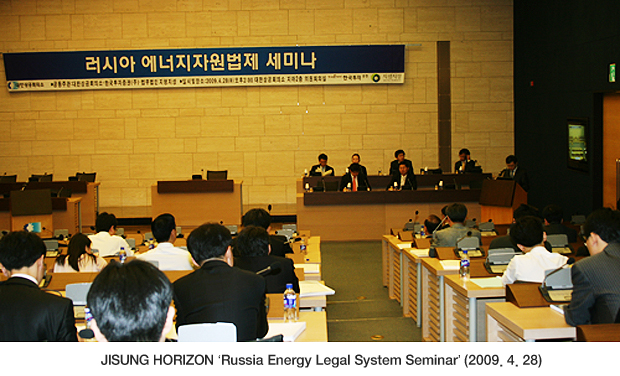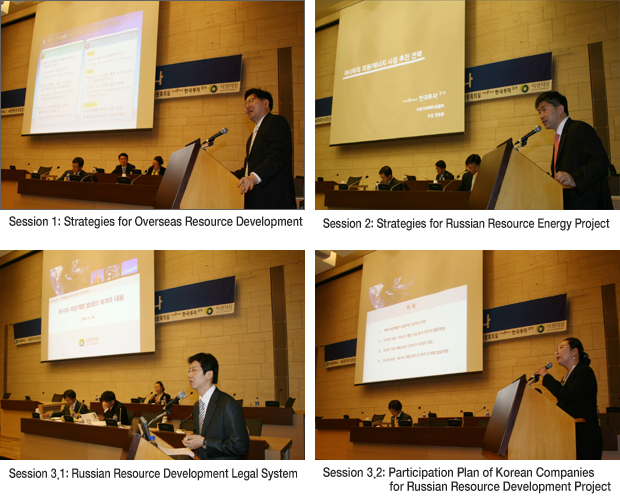Jisung Horizon Attorneys at Law has successfully held the 'Russia Energy Legal System Seminar.' Organized by the Korea Chamber of Commerce & Industry and Korea Investment & Securities Co., Ltd., on April 28, 2009, the seminar thoroughly presented information regarding all aspects of successful investment by and expansion of Korean companies in Russia.
Lecturers were government officials, a private institutional investor and Russian legal experts, making for a concise and to-the-point, yet enriching experience for participants.
The Department Chief Byung-Chul Lee of the Ministry of Knowledge Economy delivered his presentation titled 'Strategies for Overseas Resource Development,' after which Chul-Hwan Kwon from Korea Investment & Securities Co., Ltd. unveiled 'Strategies for Russian Resource Energy Project.'
In the second half, led by Jisung Horizon members, Russian Attorney Seung-Min Lee and Korean Attorney Hye-Jung Ryu showcased their in-depth knowledge on 'Russian Resource Development Legal System' and 'Participation Plan of Korean Companies for Russian Resource Development Project.'
Jisung Horizon says the event is merely the beginning of more lectures to come. It will continue to make great efforts for its clients by holding seminars that are practically helpful for their domestic and overseas operations and help them to undertake their businesses successfully.
■ Summary of Seminar
Session 1: Strategies for Overseas Resource Development (Department Chief Byung-Chul Lee of the Ministry of Knowledge Economy)
The global crude oil prices are expected to hover between 80 and 100 dollars for a long term due to worsening systematic demand and supply imbalance. Interest rates, foreign exchange rates and prices of raw materials similarly continue to experience fluctuations. To this end, the countries, that have been labeled as major consumers of natural resources, have been making full-scale efforts including political and economic measures to secure energy sources, while the supplying countries are faced with weakening nationalism due to dropping oil prices and slumping economies.
Meanwhile, the incumbent administration has decided that the overseas natural resources development will be its pan-government agenda and is fully striving for successful development. In other words, it is pushing for aggressive and speedy investment to fight the current crisis with the following strategies:
(1) M&A and Purchase of Mining Areas
(2) Active Cooperation for Energy Source Development
(3) Raising Funds and Financing for Natural Resources Development
(4) Revitalization of Investment and Improvement of Infrastructure
Session 2: Strategies for Russian Resource Energy Project (Department Manager Chul-Hwan Kwon of Korea Investment & Securities Co., Ltd.)
With Russia renowned as a resource rich nation, Sakhalin has been recently receiving attention as Russia's rich repository of natural resources. As the area is filled with oil, gas, and coal, a mid to long-term plan for infrastructure development is currently being made.
Financial institutions provide services including drawing up investment structure, risk-hedging through derivatives, as well as providing various exit measures with regard to investment in resources and energy. Korea Investment & Securities has been drawing up and implementing various plans for investment strategies by closely studying the qualities of this area. An example is an investment in "Uglegorskugol" LLC, which possesses a coal mine where a 'resources + SOC Package Scheme,' implemented through a simultaneous project for petroleum, bituminous coal and SOC development, will maximize the growth potential of the area and energy self-sufficiency as well as profits.
Session 3.1: Russian Resource Development Legal System (Russian Attorney Seung-Min Lee of Jisung Horizon Attorneys at Law)
Fifty-nine laws and ordinances are in force to regulate the development of resources in Russia. Of those, the core law governing the general use of minerals including coal and gas is the "Federal Law (hereinafter "FL") on Subsoil" (hereinafter referred to as 'Subsoil Law'). The Subsoil Law provides a guideline for regulations with regard to designation and use of subsoil.
In addition, "FL on Production Sharing Agreement" regulates all aspects for mining areas in relation to product distribution agreements such as geological surveys, exploration, development and production between the state and a private contractor (applicable for both Russians and foreigners). However, in current practice this law is generally not applied.
Meanwhile, the "FL on Continental Shelf in Russian Federation" regulates geological surveys, exploration, and mining of minerals buried in other outside jurisdictions of Russia such as inland seas, continental shelves, and exclusive economic zones. The "FL On Procedures for Foreign Investments in Companies of Strategic Significance for National Defense and Security" touches upon restrictions on share acquisitions by foreign investors in companies operating within 42 strategic industries related to national defense and security.
Other state laws relating to resource development include "FL on Concession Agreement, 'FL on Gas Export,' 'FL on Gas Supply,' 'FL on Depopulated Traditional Ecological Areas such as North, Siberia and Far East,' 'FL on Social Protection of Laborers and Mining of Coals,' 'FL on Exploitation of the Atomic Energy.' 'FL on Energy Efficiency,' 'FL on Natural Monopoly,' 'FL on Electric Industry'.
Session 3.2: Participation Plan of Korean Companies for Russian Resource Development Project (Korean Attorney Hye-Jung Ryu of Jisung Horizon Attorneys at Law)
Methods commonly used for participating in resource development projects in Russia include creating product distribution agreements, License/Royalty agreements, and M&As with local developers. Each of them has its own pros and cons, bearing legal risks under the Russian laws.
A rising issue with regard to obtaining licenses is that the government is recently restricting opportunities for foreign investors to obtain such license through various laws and regulations.
Therefore, there is a call for reviews and cooperation by experts, as legal and business issues are mounting at each stage - from preliminary studies to due diligence, signing master agreement, acquiring license for and prior to contract implementations, and implementation and registration of agreements.
[Korean Article Reference]
 |
|
 |

